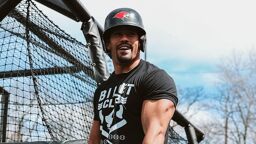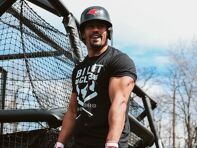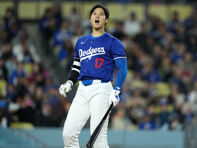When Ray Gibson speaks about his life experiences, it becomes clear that it’s important to do a lot of listening.
As a Black trans man who came of age in St. Louis and Omaha in the 1960s and 1970s, his voice is tinged with the determination of someone who has made it through a long struggle and pride in the life he has forged. In a culture where it’s nearly impossible to find Black trans male voices in mainstream discourse, his goal is to be a beacon of visibility for others in his community.
Now add in that Gibson is the transgender son of Baseball Hall of Famer Bob Gibson. Suddenly, it becomes apparent that Ray Gibson has lived a singularly unique life. And somehow, that phrase only begins to scratch the surface of his experience.
One of the common threads that binds the LGBTQ community together is the phrase “knowing I was different at an early age.” Gibson was no exception.
His recall of what set him apart is frank.
“I was 6 years old when I first became aware that something was ‘off,’ something was different. I kept thinking in my head, ‘I’m the son my dad doesn’t know he has.’”
Once Gibson was able to articulate that, it stayed with him through the rest of his childhood. But because he grew up in an era long before anyone understood the concept of “assigned female at birth,” those thoughts remained bottled up in his head. He had no words to convey his feelings to his parents or anyone else he trusted.
That doesn’t mean that he ignored them. Gibson was quite attuned to that voice telling him that he was different as an 8-year-old trans boy, remembering, “the first time I saw a penis, I didn’t think the penis was that interesting. But I wondered where mine was.” He also recalled his certainty that once puberty hit, his body would suddenly grow a penis and pecs as if his real gender would emerge fully formed from a chrysalis.
Today, he understands that other members of the trans community experienced similar feelings in childhood. But because he didn’t have the vocabulary to address them as a child, he acted out his aggressions against his parents instead.

Gibson routinely destroyed the dresses his mother bought him and convinced his dad to put him in boys clothes. He also tore out the hair of his dolls and asked instead for tetherball sets and trucks. At the time, it must have seemed like his life’s goal was to be Barbie’s worst nightmare.
When Gibson hit puberty and went through his first menstrual cycle, it was a traumatic event that brought a level of pain beyond the physical realm. His conception of himself was shattered and his body had betrayed him.
When his period hit, he locked himself in the bathroom and sobbed, “Mom, I want a sex change now!” Despite the fact that at that age, he admitted, “Back in 1970, I didn’t know such a thing existed. It just came out of my mouth.”
In other words, well before Gibson knew that transitioning was medically possible, he was still aware that he could only become his true self through that process. As he entered his teenage years, he possessed both an impressive depth of self-knowledge and a sense that he was trapped he felt in a body that wasn’t really his.
He tried to run from the battle in his head by losing himself in sports. With a father who was setting pitching records, it made sense. “I wanted to be my dad,” Gibson remembered, “and at the same time, [I knew] I couldn’t be.”
Calling Bob Gibson a baseball legend feels almost like underselling him. His career figures are something to behold: two-time World Series MVP. Two-time Cy Young winner. 1968 MVP and the modern record for lowest single-season ERA with an absurd 1.12.
But just as important, even more than a half century after his greatest feats, Gibson remains an eternal symbol of baseball badassery — a player possessed by an otherworldly sense of determination to be the best on every single pitch he ever threw. He’s still the poster child for pitchers who would brush back a hitter for committing cardinal sins like swinging too hard or making eye contact and glare at them afterward as if to say, “What are you going to do about it?”
He was also Ray Gibson’s hero.
Picture Gibson on the mound staring in for the sign — his face a mixture of defiance, disdain, and swagger as his eyes shot mental daggers through the hitter. It’s the image most of America thinks when his name is mentioned.
And then imagine having to come out to him. That should tell you something about Ray Gibson’s sense of bravery.

For one thing, when Ray was ready to come out, he still didn’t have the words to say he was transgender. Instead, at age 17, “I realized without a shadow of a doubt that I liked women,” he recalled, “and [reasoned] ‘OK, I’ve got the body of one but I like them so I must be a lesbian.’” While it turned out he wasn’t a lesbian at all, he still knew that he was different and at the time, the label provided some form of explanation.
His parents divorced in 1974 and the trauma would stay with him for many years. In fact, he remembered coming out to his parents in 1977 specifically as a rebellion against their breakup. After spending some time at the University of Colorado, Ray dropped out, returned to his hometown of Omaha, and informed his parents about his attraction to women.
He first told his mother, Charlene, over the phone “because I knew my dad would be more upset than my mom.” She initially responded like a 1970s mom, crying and asking what she had done to make this happen. But thanks to the efforts of a family friend who was a strong LGBTQ ally, she soon reached a stage of acceptance and love.
Bob Gibson, however, was another story. He was a man of his time and took his social views from the baseball locker rooms of the 1960s. That included a streak of homophobia common to that era. “He made jokes, he made comments kind of like Eddie Murphy,” Ray recalled, “…and he called them all the slurs.” Absorbing all of this, Ray became gripped with a fearful realization: “So I knew if I told him, I would become all of those slurs.”
After Ray came out, his father responded with stony silence and the two lived with an uneasy tension between them for several days. Finally, more than a week later, Ray asked his father if he could bring a girlfriend home. Which was when Bob Gibson took the fury that he usually harnessed on the pitcher’s mound and verbally unloaded it on his child.
“He called me all those slurs,” Ray remembered, “And kicked me out of the house.”
The two were estranged for a year. But Ray refused to let that be the end of their relationship.
“I was so bold,” he asserted, “My personality is almost a carbon copy of his. So I didn’t care. I was going to bring my women around him.”
Through that persistence and with the help of his father’s new girlfriend, eventually Ray got his dad to understand that he couldn’t change who his child was attracted to. They began the long process of repairing their relationship. But it was never easy.
“I chased him all of my life,” Ray confessed, “and refused to just be put over there somewhere. It happened anyway but for the most part I fought it. Because you’re my dad! I love you and there’s not a doggone thing you can do about it.”
On his own, Ray began spending time with Omaha’s lesbian community and started to grow more accustomed to the term, eventually adopting it as his identity. Then with an uncertain future ahead of him, he enlisted in the Air Force at age 19, moved to Los Angeles, and entered the military.
The mental aftereffects of his parents’ divorce stayed with him, though, and he became addicted to drugs and alcohol. Gibson felt isolated and didn’t know whom to trust or who could help him work out the feelings in his head.
Things began to turn around in 1983 when he sought help through Alcoholics Anonymous and got clean and sober. “That program saved my life,” he said. “It didn’t only save my life, it made a life. It made me. It helped me go look inside. Find that happy place.”
With a new lease on life, Gibson’s overachiever streak kicked into overdrive. Just like his father on the baseball field, Gibson went after the life he wanted and wouldn’t be denied. With his Air Force experience in computing, he found work as a software engineer despite never graduating college. He dove head-first into the self-help movement and took classes to become a motivational speaker.
“When they said ‘Take the same energy you put into tracking down drugs and drinking…and put it into your life,’ that’s exactly what I did,” he explained.

This period also coincided with a time of cautious emotional rapprochement between Gibson and his father. As Ray remembered it, “I’d call him up on the phone and tell him how much I loved him and appreciated him and respected him and, oh my God, he’s the man and he’s my hero and all this other stuff. And he was like, ‘…OK?’ He didn’t know what to do!”
Although the two were on speaking terms again and Ray was trying to get close, his father’s attitude was still “Who is this person?”
At the same time, they were finding other ways to bond. Although he was assigned female, Ray had leapt into sports from the time he was a kid and his father certainly understood that world.
Breaking through Bob Gibson’s hard exterior was tough but every now and again during this time, he’d make Ray feel appreciated. “I had to understand how he loved me,” he admitted, “How he loved me may not have been the way I wanted him to but he did love me. And he showed me in all those different ways,” such as throwing parties whenever Ray returned to Omaha.
There were genuine feelings between the two but also a great deal of confusion. The same father who would throw parties for his child also hedged at professing his unequivocal affection. Instead of the approval Ray was looking for, he found ambiguity.
Over the next couple of decades, Ray forged a successful life as a software engineer and public speaker introducing The Landmark Forum to audiences. His relationship with his father continued to exist in a rebuilding phase, to the point where Bob Gibson would call him at all hours of the night whenever he needed help with anything related to computers. Eventually his dad was so impressed with Ray’s tech skills that he termed him as “the Ray Charles of the keyboard.”
But he was still living life in the female body he was assigned at birth and even though he didn’t acknowledge it to himself, there was something nagging him. Then in 2011, Ray tuned in to “Dancing With the Stars,” beheld Chaz Bono, and his world changed. Something clicked when Ray saw Bono representing his community on TV and he began to realize who he really was. That sparked the part of his brain that desperately wanted to know more.
As he delved deeper into researching the transgender community, he began to tell himself, “This is who you are. Stop fighting it. Stop fighting it! Why are you fighting it? You can’t alter this. You’re trying. Is it working? How’s that working for you?! It just came out like, ‘OK, this is what I am. Embrace it.’”
Gibson knew that accepting he was transgender would put him at odds with mainstream society. It took three more years of major internal struggles to understand that it was also the only way he could live an authentic life. Finally at age 57, he knew who he really was. There was no going back.

Anyone who has ever come out as LGBTQ knows how frightening and mentally draining the experience can be. Now consider this: when Ray Gibson finally accepted that he was a transgender man, he knew that meant he would have to come out for the second time — this time as his real self.
Now he was really uncertain about how his family and friends would respond. Sexuality was one thing but now he was deconstructing what they had always assumed about his gender identity.
Once Gibson started testosterone at age 58, he decided that was time. When one of his aunts invited him to Thanksgiving, he realized that in order to avoid a transgender “Guess Who’s Coming to Dinner” surprise, he would have to tell her who he was ahead of time. Thankfully, it went very well.
However, that still left his father. The most difficult conversation of them all.
When Ray told his dad that he was transgender, Bob Gibson initially responded with the same mask of stony silence that he assumed the first time Ray came out. He was impossible to read. Was this going to end with a similar explosion of anger and bitter acrimony?
This time, though, Ray took charge of the situation:
“I told him and then I kept it moving. That’s one thing about me: I’ll see these roadblocks and I’ll just…BOOM! Knock ‘em down and go this way. So that’s what I did. I knocked it down and went that way and I came out in a big way.”
In this instance, that meant refusing to let his father’s reaction dictate the situation. Shortly, after telling his father, Ray posted a coming out announcement on Facebook and was met with a tidal wave of love and acceptance from friends — and from numerous family members.
As he explained, “The way that I came out was like, ‘You ain’t gotta like it. You can hate me. You can not love me anymore. It’s fine. I’ll be alright. Because I’ve embraced me. And I love me. So go ahead…unfriend me, do whatever you gotta do. But I’m coming out here.”
It’s in his retelling of that moment where it becomes apparent that at the most crucial time of his life, Ray Gibson was not simply a transgender man and the child of a baseball legend. When he spoke in that measured but forceful tone of defiance and determination, it suddenly becomes clear…
When he needed to be the most courageous he’d ever been, Ray Gibson was his father’s son.
Bob Gibson’s almost superhuman levels of conviction and pride led him to historic heights on the pitcher’s mound. Ray inherited those same qualities and called on them when he needed to show the world his true self and make it accept him for who he was. As Ray phrased it, “Winning was most important to him. And somehow that rubbed off on me. I wasn’t playing games, I was playing life…so it became my way of doing life.”
The outpouring of love and support he received upon coming out as transgender inspired Ray to come out in an even bigger way than he’d ever imagined. Now that modern society had given him the terminology to understand who he was, he came out in the most 21st century way possible: becoming a YouTube content creator.
“I had all this stuff in my head,” he recalled, “And when [coming out] happened, the freedom…the lack of fear — which just goes along with my whole life, I hate being afraid — that stuff relaxed and I started just being all over the place.”
There was no explosion from Bob Gibson when Ray came out as transgender. But that didn’t mean that he understood it. Ray, however, was undaunted. Relying on the courage he had shown and the validation from so many others, he applied his determination to building a relationship with his father as his authentic self.
Sadly, it was at this time where Bob Gibson’s health began to decline after being diagnosed with pancreatic cancer. Ray moved back home to Omaha to be there when his father needed help. Although his dad would still misgender him and call him by his deadname, Ray’s focus on forging a genuine bond remained undaunted.
“I was just there to love him. Whether he understood me or not,” Ray asserted. The two of them began to have heart to heart conversations and Ray was able to bare his soul. Every so often, he would get through.
As Ray remembered, “I did get to tell him that he was my hero and my role model and he didn’t know it. I did get to tell him some of the thoughts I had as a child. And he was very gentle which…it was very seldom for my father to be gentle. But he said, ‘Oh my God, I’m so sorry. I didn’t know.’
“I said, ‘That’s OK, Dad…I didn’t know either! So I didn’t know what to tell you to do. And you didn’t know so it was what it was. I’m at peace.”
There was understanding and Ray could see it. But with that also came the knowledge that his dad’s health was slipping away — and the sadness of knowing that just as he was able to reveal parts that he’d hidden all his life to his dad, they wouldn’t have much time left to build on that relationship.

When Bob Gibson was in hospice as the end drew near, Ray visited him in his bedroom. His father’s body was weak from cancer and the treatments he’d received and Ray watched over him for a while as he slept.
At one point, his father awoke and saw Ray keeping watch over him. Surprised to see him at his bedside, Bob Gibson finally asked his son, “What are you doing here, man?”
It was the first time Ray’s father referred to him as a man. With his father nearing the end, Ray heard what he had been waiting for his entire life.
“It was like an explosion in my head,” he remembered, “Oh my God, he finally got it! On his deathbed, he got it!”
A later conversation with his dad’s second wife confirmed that Bob Gibson understood who his son was in the last days of his life. To say the least, it was bittersweet. As Ray ruefully summed it up, “He got it at that time. When there was no time left. That makes me really sad.”
Today at age 64, Ray Gibson lives in the southeastern US, aspiring to be a more public face as his true self. Although currently single, he’s still looking to meet someone special and eventually finding a wife.
He maintains a social media presence on YouTube which he uses for activism and education, especially in regards to his life experiences. He also took the field at Busch Stadium when the St. Louis Cardinals held a ceremony in remembrance of his father. Any time he’s asked, he gives his unfiltered opinion on what it means to live as a Black transgender man in today’s society.
He still wishes he had more time to establish a bond with his father while acknowledging at the same time that his dad was able to evolve some before his time ran out. Those conflicting feelings have stuck with him and he’s still processing them to this day.
Ultimately, Ray Gibson had to go through a lot to become the man he is. But the fact that he was able to get there and become the person he was meant to be is due in no small part to living up to being Bob Gibson’s son.







































